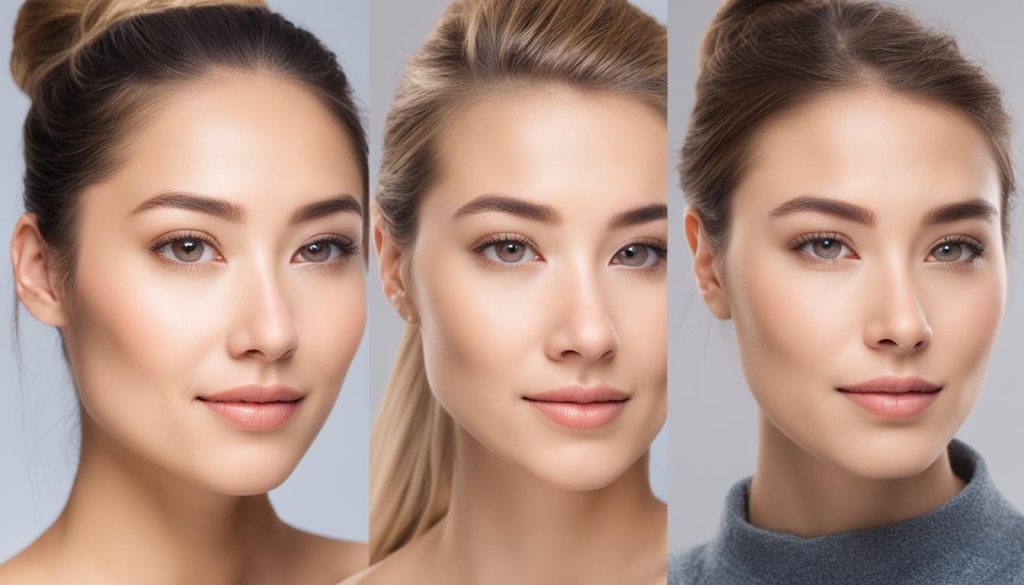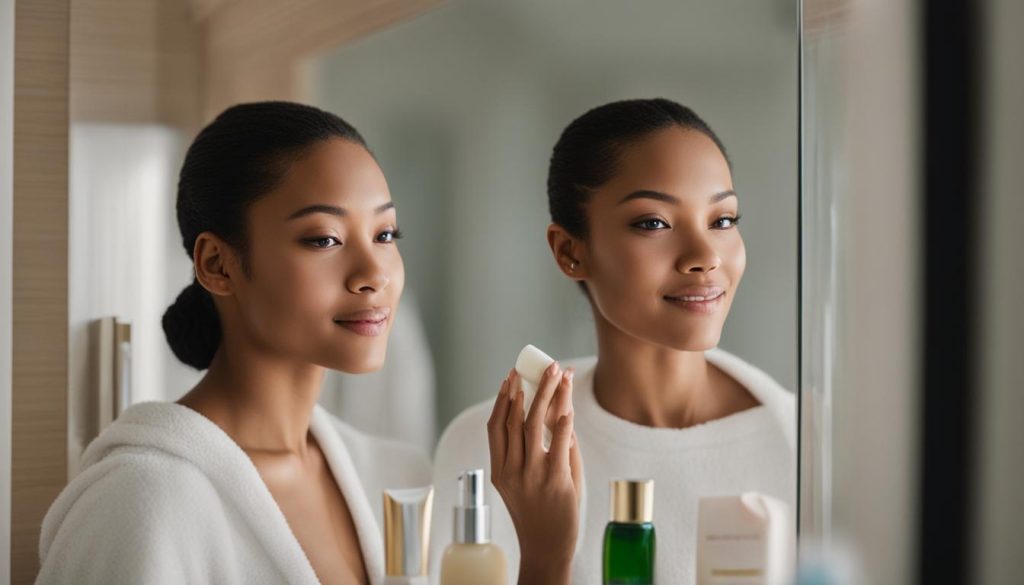As a discerning consumer, I often navigate the saturated market of skin care, questioning the effectiveness of skin care products that promise to be the secret key to longevity. I’m not alone. This is a widespread query: “Does skin care really work?” With each new product release, the anticipation to achieve proven skincare results builds, yet a mindful approach to evaluate skin care effectiveness is crucial.
Centrally featured in my concerns are the ostensibly evergreen products that keep our skin closets perennially stocked—moisturizers. Renowned dermatologist Katrina Abuabara from UCSF asserts their essential role in protecting the aging skin’s barrier. This protection is more than cosmetic; it’s a guard against inflammation that can have expansive health implications. Remarkably, ointments as modest as Vaseline have shown to dampen inflammation, hinting at a low-cost weapon against age and environmental assault.
Thus, when deliberating over skincare results, it’s not just about surface-level beauty but what feels like the bedrock of wellness—our skin. The question of “Do skincare products actually work?” begs for a nuanced answer that considers not just the face value but the science beneath the skin care results that we seek.
Does Skin Care Really Work?
- Understanding the effectiveness of skin care products goes beyond their aesthetic benefits.
- Simple, everyday products like moisturizers play a crucial role in maintaining skin barrier function.
- Skincare is not solely a beauty routine but a health-preserving measure, especially as we age.
- Low-cost skincare options can be surprisingly effective in combating skin inflammation.
- Proven skincare is rooted in science, with studies supporting the benefits of consistent use.
- Skincare results from reputable products and regimens may provide more than just surface-level improvement.
- Engaging with skincare is a personal journey that requires a blend of skepticism towards ambitious marketing and openness to dermatologically approved practices.
The Fundamental Importance of Skin Care Routines
As a seasoned journalist with a passion for skin care, I’ve often found myself pondering over the question, “do you need a skin care routine?” and its undeniable relevance in today’s beauty landscape. From my extensive research and interviews with experts like Katrina Abuabara, MD, it’s become increasingly clear that there’s more to these routines than meets the eye.
Exploring the aisles teeming with an array of beauty products, I’ve learned that skin care routine importance cannot be overstated. Not merely a cosmetic indulgence, a proper regime serves as a cornerstone for maintaining the quintessential defensive barrier of the skin.
Navigating the Skin Care Aisle: Must-Haves Versus Marketing Hype
In my quest to uncover the truth behind the efficacy of skin care routines, I uncovered a simple yet profound fact: not all products are created equal. Dr. Abuabara’s insights reveal how essential it is to differentiate between the must-haves and the mere marketing hype. Among the maze of products, the linchpins of any effective skin care regimen are, undeniably, moisturizers and sunscreen.
The Role of Skin Care in Maintaining the Skin Barrier Function
Delving deep into dermatological studies, I grasped the significance of the skin’s barrier function—it’s the unsung hero, the shield guarding against environmental assailants. Moisturizers, specifically, fortify this barrier, which could otherwise succumb to age and harmful elements, inviting inflammation. This isn’t just about avoiding temporary redness or dryness, it’s about thwarting systemic inflammation that’s linked to perilously high risks for conditions like cardiovascular diseases.
Expert Opinion on Moisturizers: Simplicity for Anti-Aging Efficacy
- Usefulness transcends price—drugstore moisturizers can be just as beneficial.
- Consistent application is key—ointments to lotions can pave the way for healthy, youthful skin.
- Focus on what’s needed—simplicity in your routine can lead to anti-aging efficacy.
So, when asked, “is a skin care routine necessary?,” my definitive response is a resounding “yes”. The right routine is paramount, not only for the allure of timeless beauty but for its role in preserving our well-being. As I bear witness to the transformative powers of dedicated skin care, I am convinced that not only do skin care routines actually work, but they hold important implications for our overall health.
Understanding Sunscreen: Necessity or Overprotection?
In the perennial quest to uphold skin health, one question persists—is skin care important enough to warrant the daily application of sunscreen? Let’s shed some light on this crucial issue, bringing forth evidence-based insights from dermatology experts. As I explore this topic, the efficacy of skin care routines comes to the fore, especially in the context of sunscreen use and its implications on skin cancer prevention and vitamin D synthesis.
Debunking Myths: Vitamin D and Sun Exposure
It is a common belief that using sunscreen might lead to vitamin D deficiency, thus skewing the argument of skincare effectiveness towards minimal use. However, authoritative voices from UCSF, including Dr. Lindy Fox, emphasize that typical sunscreen use does not significantly diminish vitamin D levels. Most individuals acquire sufficient vitamin D even with sunscreen application, courtesy of incidental sun exposure—a beacon of reassurance for those pondering, does skin care work when juxtaposed with natural nutrient synthesis.
The Science Behind Sunscreen Use and Skin Cancer Prevention
The debate around skin care vs no skin care often centers on visible skincare effectiveness, but delving deeper, the conversation shifts towards invisible yet severe implications like skin cancer. The persuasive argument stands that consistent sunscreen use is pivotal in mitigating the risk of skin cancer, offering a stark choice between prevention and cure and reinforcing the necessity of a preventative skin care routine.
Recommended Application: Maximizing Sunscreen Efficacy
Understanding the correct use of sunscreen is tantamount to accepting the premise that a skin care routine does work—when performed accurately. Sunscreen should be applied liberally, with about one ounce required to fully cover the body and reapplications scheduled every two hours, or after swimming or perspiring. This level of diligence ensures optimized protection and upholds the merits of a dedicated skin care regimen.

For those pondering does a skin care routine work in the grand scheme of things, I propose that a disciplined approach, especially with sunscreen, not only works but serves as an essential barrier against harmful elements. Pairing sunscreen with additional protective layers like sun-protective clothing, starts from the acknowledgment of the effectiveness of skin care in conserving both our immediate complexion and our long-term well-being.
Does Skin Care Really Work for Dark Skin Tones?
As a journalist passionate about effective skin care, I’ve immersed myself in the research surrounding does skin care actually work, especially for diverse complexions. The insights of Dr. Jenna Lester, who heads the Skin of Color Program at UCSF, emphasize a crucial narrative in skincare—that darker skin tones require just as much protection and care, if not more, due to certain overlooked risks.
Despite common beliefs, the melanin in darker skin doesn’t fully shield against UV rays or the potential severity of conditions like melanoma. A personalized skin care routine for different skin types not only reduces the risk of cancer but plays an indispensable role in preventing hyperpigmentation, maintaining an even skin tone, and ensuring overall dermal health.
- Higher melanin levels are not a comprehensive shield against UV damage
- The importance of sunscreen transcends beyond skin cancer prevention
- Pigment disorders, more common in darker tones, necessitate consistent sun protection
Through my experience and conversations with experts like Dr. Lester, I’ve come to recognize the importance of tailored skincare efficacy. Each skin type demands a customized approach that takes into account its distinct characteristics, challenges, and needs. The narrative that all skin types can follow a universal skin care regimen is swiftly being debunked by modern dermatological science.
In essence, affirmative answers aside to does skin care actually work, lie in how we adapt routines and products to our personalized contexts. This ensures that skin care is not just a superficial routine but a meaningful regimen that upholds the beauty and health of every skin color.
Natural vs. Scientific Skincare: What Experts Say
As someone deeply embedded in the world of skincare, I’ve witnessed first-hand the growing debate between the benefits of natural products and the efficacy of scientific skincare. It’s crucial to sift through the marketing jargon to uncover what truly works for our skin. Dermatologist-approved skin care often includes ingredients with substantial evidence backing their benefits, standing in contrast to the buzzwords like “clean” and “natural” that have saturated the industry.

Defining “Clean” Beauty: A Dermatological Perspective
The term “clean beauty” has been swaying consumers with the promise of being safer and more ethical. However, the lack of a regulated definition makes it a nebulous concept in dermatology. While the intentions behind clean beauty might be positive, the reality is that without scientific backing, these products could lead to irritation or allergic reactions. Is skin care necessary for maintaining skin health? Absolutely. But it must be founded on credible skincare science rather than undefined labels.
Key Ingredients for Skin Health: An Expert Take
- Retinoids: Celebrated for their anti-aging prowess, retinoids can help diminish the appearance of wrinkles and fine lines.
- Niacinamide: Known for its hydrating properties, niacinamide is also a hero for restoring the skin’s barrier function.
- Ceramides: Integral to skin’s moisture retention, ceramides solidify the barrier against environmental aggressors.
- Squalane: A source of improved skin elasticity, squalane mimics the skin’s natural oils.
These are the cornerstones of effective skincare products that have stood the test of rigorous scientific enquiry. Unlike certain natural alternatives, these ingredients are generally well-tolerated and widely recommended by skin care professionals.
Addressing the Misconceptions Attached to Organic Skin Care
The allure of organic skin care often hinges on the perception that it is inherently gentler or more beneficial. However, when it comes to ensuring skin health, the axiom ‘organic is always better’ does not hold fast. The core question remains: Is skin care necessary regardless of its source? Yes, but efficacy and safety should be the primary criteria when selecting skincare products. Scientific skincare products go through extensive testing to establish their efficacy, offering peace of mind that is often absent in the largely unregulated realm of organic skincare products.
Proven Benefits of Skin Care: Insights from Dermatologists
As a journalist deeply embedded in the world of dermatology, I’ve witnessed firsthand how do skincare routines improve skin is more than just a catchy headline; it’s a factual statement supported by countless experts in the field. My conversations with leading dermatologists consistently reveal the proven benefits of skin care, debunking the ever-persistent skin care myths that float around in consumer circles.
The dermatologists I’ve interviewed each maintain their own skin care regimens, integrating high-quality products like La Roche-Posay Toleriane Gentle Cleanser and Elizabeth Arden Retinol Serum Ceramide Capsules. These professionals emphasize that the keystones of an effective regimen include not just cleansing, but also targeted treatments catered to individual skin types, thorough moisturizing, and the strategic use of advanced technology such as LED masks and dietary supplements. Such comprehensive, dermatologist-recommended routines focus on specific concerns, whether it’s combatting acne, reducing sensitivity, or alleviating dryness. By balancing scientific innovation with proven ingredients, these routines exemplify the benefits of skincare at their finest.
Let’s put some of these insights into perspective:
- Cleansing: The essential first step in any skincare routine, it sets the stage for a clean canvas, removing impurities and preparing the skin for subsequent products.
- Targeted Treatments: Specific issues require specific solutions, and that’s where targeted treatments come in—be it for acne, pigmentation, wrinkles, or redness.
- Moisturizing: A vital element for maintaining skin barrier health and hydration, moisturizers lock in the benefits of the treatments applied beforehand.
- Advanced Technology: Incorporating the latest in skincare technology, such as LED light therapy, boosts the regimen’s effectiveness by supporting cellular rejuvenation and addressing aging signs.
Through these methods, dermatologists illustrate time and again how a meticulously curated skincare routine can dramatically improve skin health and appearance, thereby validating the proven benefits of skin care. By replacing misinformation with solid expertise, we can continue to enhance public understanding of skincare efficacy and transform routines into powerful tools for lasting skin health.
Customized Skin Care: Effective Results for Different Skin Types
Embarking on the journey of personalized skin care is not just a trend; it’s a cornerstone of achieving visible and sustained skin health outcomes tailored specifically for you. Recognizing that each person’s skin exhibits unique characteristics and concerns, dermatologists are endorsing customized skincare routines. These are designed to hone in on individual needs, treating normal, oily, dry, sensitive, or acne-prone skin with precision. It’s the intricate balance of thorough cleansing, targeted treatments, ample hydration, and consistent sun protection that forms the essence of these personalized regimens.
My exploration into the world of skincare for you has shown that integrating specific products is crucial. For instance, a person with dry skin might leverage a richer moisturizer formulated with hyaluronic acid, while those with oily skin may opt for a light, non-comedogenic hydrator. Products containing potent serums enriched with retinol or Vitamin C are selectively recommended by skincare professionals to address signs of aging or to provide an antioxidant boost, depending on the skin care routine for different skin concerns. The results — when a routine is well-curated — are undeniable, manifesting as tailored skincare results that are both dynamic and effectively resonate with your skin’s unique language.
In my own practice of adopting a customized skincare routine, the transformative potential of such an approach has been profoundly evident. Matching the right ingredients to my skin’s needs has not just improved its appearance, but has also instilled a sense of confidence in my daily interactions. It underscores the pertinence of embracing personalized skin care; it’s an investment that pays dividends in the form of a vibrant, healthy complexion. The adage ‘one size fits all’ cannot hold sway in the nuanced realm of skincare — the efficacies witnessed from bespoke regimens encapsulate the true spirit of individual beauty and well-being.
FAQ
Does skin care really work?
Yes, skin care does work when the right products are used consistently and appropriately. Scientific research and dermatologist expertise collectively affirm the effectiveness of skin care products, with proven ingredients delivering measurable results.
Is a skin care routine necessary?
A consistent skin care routine is important for maintaining the skin’s health, functionality, and appearance. Regular care, including cleansing and moisturizing, supports the skin barrier, mitigates the impact of environmental stressors, and can help prevent age-related changes.
Do skin care routines actually work?
Skin care routines can be highly effective, especially when tailored to an individual’s skin type and needs. They work by addressing specific skin concerns with targeted treatments, maintaining hydration, and protecting the skin from external damage.
Does skin care work for maintaining the skin barrier function?
Absolutely. Dermatologists emphasize the role of skin care in preserving the integrity of the skin barrier. Proper skin care, especially the use of moisturizers, helps to protect the skin against dehydration and external irritants, which is crucial for overall skin health.
Can sunscreen still allow for vitamin D synthesis?
Yes, people typically still synthesize enough vitamin D even when they regularly use sunscreen. While sunscreens can reduce direct skin absorption of UV rays, incidental sun exposure and other sources often provide sufficient vitamin D.
Is sunscreen necessary for individuals with darker skin tones?
Sunscreen is needed for all skin tones. While darker skin provides some natural protection against skin cancer, everyone can benefit from sunscreen’s ability to prevent photoaging, pigment disorders, and melanoma.
Are “natural” or “organic” skin care products better than scientific skincare?
The terms “natural” and “organic” do not automatically make a skin care product better or safer. It is the effectiveness and safety profile of the ingredients, not the source, that determines the product’s value. Dermatologists recommend focusing on scientifically proven and well-researched ingredients.
What are the proven benefits of skincare?
The proven benefits of regular and appropriate skincare include hydration, improved skin texture and tone, reduced signs of aging, protection against environmental damage, and prevention of certain skin diseases.
Can a customized skin care routine provide effective results for different skin types?
Yes, a customized skincare routine, developed with an understanding of an individual’s unique skin type and concerns, can lead to effective and satisfying results. Dermatologists often create personalized regimens that can help improve skin health and treat specific conditions more effectively.






